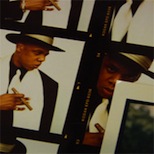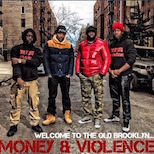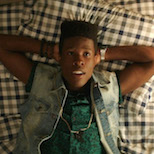South African Comedian Trevor Noah Discusses His Work And Time In The U.S.
07.09.2013
LEISURE
Quickly after beginning Born A Crime at 45 Bleecker St. in NoHo, South African comedian Trevor Noah riffed that one of the main reasons he wanted to come to America was he wanted to be Black. Noah, who’s mother is Black and father is White, was only considered mixed – not Black – growing up in an Apartheid-riddled South Africa. Reflecting on his time in the States, he affirmed that Black is as cool as advertised. “A lot of Black Americans don’t even realize how cool they are,” he said. “It’s so interesting to travel the world and see how people view themselves. Black Americans still have that cool, it’s not going anywhere. It’s entrenched in the culture, the music, the movies, it’s part of who the people are. In South Africa, we have slowly started becoming proud of who we are.” Most recently, Noah just finished his Born A Crime run in New York, but will return to the U.S. in June. On July 5th, Showtime will premiere his new special, Trevor Noah: African American. Life+Times caught up with Noah to discuss his time in the U.S., South African comedy and more.
Life+Times: How is New York, and how does it compare to South Africa?
Trevor Noah: New York. Wow. I wish I could compare New York to South Africa. New York is New York. It’s one of those few cities in the world that’s beyond everything in terms of entertainment, in terms of its culture, in terms of its diversity. It’s one of the most amazing places in the world, so I’ve always dreamed of doing a show here, to perform, to live in the place for a bit, to explore. New York is much further along than we are in South Africa in terms of segregation and integration. In South Africa we still are a very segregated society. Even though in New York, it’s not like everyone is holding hands, but it’s a very mixed, even for America. I’ve never seen a place like this where mixed couples walk down the street and nobody bats an eyelid. It’s this world where everyone is doing what they’re doing. In fact, I’ve found there’s more beef between boroughs than races. It’s been an amazing journey.
L+T: How has the North American response to your show been?
TN: Well New York is smaller shows. Back home I’m used to doing mostly theaters and sometimes arenas. But I prefer theaters, so I’m used to doing 2,00 people per night for a few weeks. But everything started in a small theater in South Africa, and in London I started doing small theaters and now, I’m getting ready to do the Hammersmith Apollo. It’s a journey that you have to take. I’m never in a rush. It’s just about each person that comes in. New York has been amazing in that I’ve had all types of people come in, old, young, every nationality, race and watch the show. I couldn’t have asked for anything better, it’s been amazing.
L+T: Does the show change depending on what country you’re in?
TN: Yeah, definitely. When I go to different countries, no two shows of mine are the same. I do keep the same story in a show, especially if I give it a specific title, then I like to have a theme that I stick to. But if I go to a different country, I don’t perform in Australia like I’m in New York. I would be blind to the place to do that. So I always speak about the place, I like to speak to people. It’s not TV, I want them to feel like they make a difference because the audience is part of my show. It makes a huge difference.
L+T: Talk about South African comedy and where you are in the lineage of South African comedians.
TN: The lineage of South African comedians is in its first iteration. Comedy was illegal in South Africa in many forms. You could not speak about the government, there was no satire allowed, there was no free speech, so until 1994 there was really no platform for comedians. A Black comedian – just as a Black person speaking in public – you were risking your life, that was not something you did. There were a few white comedians that would speak out against the government and they were arrested, so it didn’t matter. Comedy started really in the late 1990’s. There were a few guys that got into it and I guess I’m sort of at the tail-end of that first wave, there were about seven or eight guys that started doing it. Comedy itself in South Africa is only about 15 or 16 years old and I’ve been doing it for six, so I’ve been doing it for about half the time that it’s existed. So in terms of the lineage, we’re at the beginning. We’re at a great place in comedy in South Africa.
L+T: In America, comedy is often used to talk about things that otherwise couldn’t be discussed. Is it the same thing with you in South Africa?
TN: It’s the same thing. It’s been amazing in South Africa, we use comedy as a tool because we come from, as the world knows, a very racial past. We just had our Civil Rights movement, we just had our big change. So, it’s something that’s really been used consistently as a tool to get us where we need to be. We’re not there yet, but comedy is a fantastic platform to get people to come together without being preached to. You laugh about it, you have a good time, it’s a fantastic tool.
L+T: Talk about the titles of your shows – The Racist, Born A Crime, [Showtime Special] African American – and your unique experience growing up that allows you to speak on things the way that you do.
TN: Growing up in a mixed family in a country where being mixed was illegal, you grow up with a perspective on life that is very unique. You are not immediately predisposed to one side, you’re not looking at it from any one perspective. I’ve always identified as Black, I believe I’m Black culturally, that’s the only world I grew up in, that’s all I know. I know it from the small things. If I hear gun shots or loud sounds, I go the opposite direction. It’s those small things where you go, “Ok, I think I’m Black.” [laughs] You know, you can feel it, so culturally I’m very Black, but I grew up in a world where I was aware of the opposite side. I was always made aware of it by people. So when you grow up in a world where you’re a product of very liberal people – my parents being together was a crime, me being born was a crime – it gives you a different way of looking at life, and that’s why I name my shows the way that I do. I try to encompass what the show will really be about it the title. It’s not really to shock, it’s just what I’m thinking and I go, “You know what, that’s how I feel about the show.” For instance, “Born A Crime,” self-explanatory; “The Racist” was because I got sick of the PC world we were living in where real racists were almost going uninhibited, they were just doing their thing, acting like they weren’t racist, and now you couldn’t be a normal person and not be called racist, just this weird world; and then “African American” because that’s something I’ve always loved. Black Americans have a fantastic connection with Africa in terms of their aspirational level. All of them, the Jay-Z’s – he’s seen it when he goes Africa how people love, in Nigeria they named a street after him – Beyonce, Kanye West. The love that they experience there is as big as anywhere else in the world. So there is that connection at the end of the day. For me, African American came from when I was living in the States for about two years and I was literally an African-American in the truest sense of the word.
L+T: Where is the toughest audience?
TN: Wow. You know, there’s no place with tough audiences, just environments for tough audiences – rooms that have a lot of food, lots of music, noise, rooms where people are drunk, rowdy. Baltimore, Maryland had some of the craziest crowds I’ve ever done. I had guys trip the fire alarm in the restaurant so that they didn’t have to pay their bill. So they would trip the fire alarm near the end of the set so that they could run out. And you’re on stage while this is happening, the manager is telling you to keep going. So it’s not hard audiences really, just tough environments.
Trevor Noah’s special Trevor Noah: African American is currently on Showtime.





